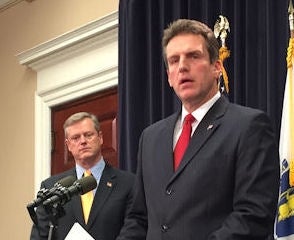Tax uncertainty could affect low-income housing, development chief says
 File photo
Housing and Economic Development Secretary Jay Ash, right, said tax-code uncertainty may hurt low-income developments that rely on tax credits.
File photo
Housing and Economic Development Secretary Jay Ash, right, said tax-code uncertainty may hurt low-income developments that rely on tax credits.
Plans in the U.S. Capitol to simplify and flatten the federal tax code are creating uncertainty for affordable housing developments that rely on tax credits for funding, the Baker administration's top housing official said Monday.
"It's unclear what the tax climate is going to be and as a result the low-income housing tax credits that support affordable housing development in our communities is uncertain," Housing and Economic Development Secretary Jay Ash told lawmakers at a budget hearing in Everett.
"As Washington considers tax reform," he said, "the investors who would have bought the low income housing tax credits are now wondering what their tax liability will be in the future, and as a result perhaps aren't going to invest as heavily in housing tax credits."
Ash plans to travel to Washington, D.C. early next week with other economic development officials, where he said he will meet with U.S. Commerce Secretary Wilbur Ross to discuss the importance of the low income housing tax credits and immigrant work visas.
According to the Office of Housing and Economic Development, the state committed $16.2 million in federal low-income housing tax credits last year, and there is an annual cap of $20 million on state low-income housing tax credits.
After sidelining efforts to replace the Affordable Care Act, the Republican-led Congress and President Donald Trump are gearing up to overhaul the tax code. On his website, U.S. House Speaker Paul Ryan said his plan would "make the tax code simpler, fairer, and flatter," make it easier to create jobs and refocus the Internal Revenue Service.
According to a transcript, White House Press Secretary Sean Spicer last week said the current tax code is "unattractive for a lot of companies that want to either manufacture here, grow here, or begin here, or want to return jobs here.
"I think our tax code is outdated," Spicer said. "And, frankly, on the business side, we're uncompetitive."
Sen. Sal DiDomenico, an Everett Democrat who is chairman of the Senate Committee on Intergovernmental Affairs, asked Ash at Monday's budget hearing about the potential impacts on Massachusetts from actions in Washington.
In 2015, the Department of Housing and Community Development awarded state and federal tax credits to support more than 1,400 multi-family rental units, according to the administration. An administration report on the program said that in 2015 demand for the credit "remained at or near its all-time high."
Since the program of financing low-income tax credits began in 1987, it has supported the production or preservation of more than 45,000 affordable multifamily rental units in Massachusetts, the administration report stated.
"The impact could be less money for affordable housing, so it would be a concern of ours because we rely upon it so heavily," Ash told the News Service about the potential effects of tax changes.
Testifying before the House and Senate Ways and Means committees at Everett High School, Ash reported some positive data points on shelter for Massachusetts residents.
Since Gov. Charlie Baker took office, the number of families living in motels - which were turned to as an overflow from homeless shelters - has declined by 1,500, Ash said. In late March, there were 67 families in overflow motel shelters, according to Ash's budget testimony.
The number of motels providing shelter has dropped from 47 to two - one in Waltham and another on the Melrose-Malden line - according to Ash, who said there has been a 23 percent decline in the number of families housed in shelters and motels since Baker took office.
As of March 28, there were 3,535 families receiving shelter in the state, according to Ash. The housing secretary predicted $14 million in savings available from the caseload-driven emergency family shelter program. Those savings would free up money for a $97.5 million investment in the state's rental voucher program, a $12.1 million increase from the fiscal 2017 budget, Ash said.
Ash also advocated for a provision of the governor's budget (H 1) that would raise income eligibility for the rental voucher program to those earning 80 percent of area median income, up from the current cutoff of 50 percent. Ash said that change would remove "disincentives" to finding work.
"We come to this with the perspective that heads of households want to work," Ash told lawmakers.









0 Comments